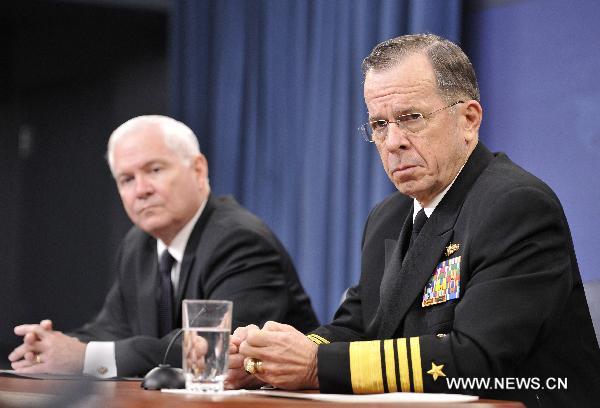Pentagon releases study on military gay ban
U.S. Defense Secretary Robert Gates on Tuesday released the findings of a comprehensive study on military personnel's opinion on the ban on gays serving openly in uniform, noting that "strong majority" of the military do not object to gays and lesbians serving openly. He recommended the Congress repeal the "Don't Ask, Don't Tell" policy.
"The findings suggest that for large segments of the military the repeal of 'Don't Ask, Don't Tell,' though potentially disruptive in the short term, would not be the wrenching, traumatic change that many have feared and predicted," Gates said.
A majority -- about 55 percent -- of respondents to a survey sent to 400,000 servicemembers in the active and reserve military components said allowing gays to serve openly would have either no effect or a balance of positive and negative effects on the military, and between 15 and 20 percent said such a change would have only positive effects.
About 30 percent of respondents said overturning the law would have a mostly negative impact, and those respondents mostly were part of the warfighting specialties, according to Army Gen. Carter Ham, commanding general of U.S. Army Europe, who co-chaired the Pentagon study group on the issue.
Gates urged the Congress to repeal the "Don't Ask, Don't Tell" policy, and send it for President Barack Obama's signature by the end of this year. But he warned it would be "unwise" to implement the full repeal before the military is properly prepared in order to avoid potential disruptive impact from the repeal.
"It is important that this change come via legislative means," Gates said, noting "what is needed is a process that allows for a well-prepared and well-considered implementation."
Mike Mullen, chairman of the Joint Chiefs of Staff, who sat alongside Gates in the Pentagon briefing Tuesday, said "whatever the decision of our elected leaders may be, we in uniform have an obligation to follow orders. When those orders involve significant change, such as this would, we need to find ways to lead the way forward."
The "Don't ask, don't tell" policy, which was introduced as a compromise measure in 1993 by then-President Bill Clinton, prohibits homosexuals to serve openly in the military. It has been a major contentious issue in U.S. politics. Critics including gay rights groups argue that the policy violates the rights of gay military members to free speech and open association.
The issue has come under increasing scrutiny as a lawsuit challenging the 17-year-old law worked its way through the federal courts this year, and is scheduled to be heard by a federal appeals court in the spring. Congress has before it a bill that would repeal the law, but it is unclear yet whether they will vote on it before the session ends and a new Congress takes over in January. Obama, Gates and Mullen have all said they support congressional repeal of the law.
 0
0 








Go to Forum >>0 Comments